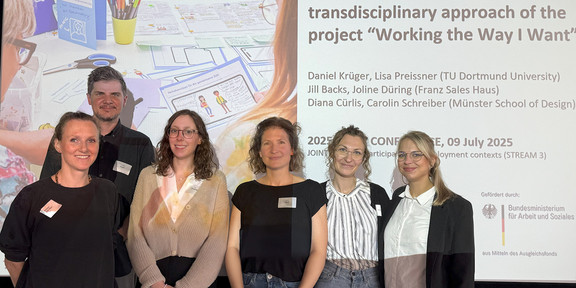2025
Joint session of the AWIEW project at the ALTER conference in Innsbruck

As part of the 13th conference of the European Society for Disability Research (ALTER) at the Ágnes-Heller-Haus at the University of Innsbruck, Lisa Preissner and Daniel Krüger organised a focus session with 3 contributions from the project "Working - the way I want to!".
Lisa Preissner and Daniel Krüger from the Social Research Centre started the session with a first presentation. They gave an introduction to integration assistance in Germany and made the connection to the participation in work of people with disabilities, for whom sheltered workshops continue to be a central, albeit segregating, instrument for participation in labour. They also presented the project's approach, which aims at the promotion of more transitions to the general labour market with the help of an AI-supported needs assessment tool. In the final part of the presentation, they provided insights into findings from embedded research in integration assistance facilities and from interviews with business company members on the employment of people with disabilities in the general labour market, which have numerous implications for the development of the needs assessment tool.
Jill Backs and Joline Düring from Franz-Sales-Haus followed up with a presentation full of insights into the day-to-day experiences of people with disabilities taking part in measures of integration assistance. The presentation allowed clients from workshops to have their say in videos and, enriched with various context information, drew attention to deficits and opportunities that need to be taken into account for the development of the needs assessment tool.
In the third presentation, Carolin Schreiber and Diana Cürlis from the Münster School of Design at Münster University of Applied Sciences offered insights into the participatory co-design of the needs assessment tool with co-designers who are clients in sheltered workshops. This approach involves the target group directly in the development process of the needs assessment tool. Finally, the presentation also provided initial insights into the development paths of the AI-supported tool.
Overall, the session was characterised by lively discussions and a wide range of questions and suggestions from the audience of around 25 international academics who are engaged in disability studies and disability research on a daily basis.




![[Translate to English:] [Translate to English:]](/storages/zentraler_bilderpool/_processed_/a/f/csm_Kontakt_b86e8d8ecc.png)
![[Translate to English:] [Translate to English:]](/storages/sfs-sowi/_processed_/7/e/csm_header_collage_sfs_eving_sozialforschungsstelle_dortmund_31bd3c09fb.jpg)